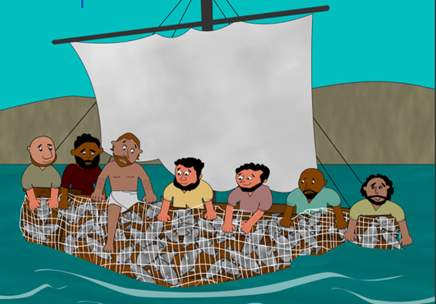First Small Group Fishing Trip.
Jesus had told His disciples to meet Him in Galilee, but only seven were able to make the trip and Jesus was nowhere to be found. So, the small group leader, Peter, said he was going fishing and the others followed. After sitting in a boat all night with no fish to show for it, a guy on the beach says they’ll find fish if they throw their net in on the right side of the boat. Yeah right. But to their amazement, once they did, they couldn’t haul in the net because of the large number of fish. It’s at this point that John realizes it’s Jesus, Peter swims to shore, and the group follows. (John 21:1-8)

To summarize, the small group intended to meet up with Jesus, but they couldn’t see or hear Him. So, they decided to do something they knew how to do; however, that failed. But then Jesus shows up (But God… Rm 5:8) and one person notices and says something. And then the whole group sees Jesus.
It’s funny, but that’s how a lot of small group bible studies go. At the onset, no one notices Jesus. Then someone sees something in scripture and talks about it. Next, someone sees something else and then that triggers another person’s thoughts and then the whole group sees Jesus and we’re amazed (Matt 18:20).
The book of John is the only gospel that concludes with a small group encounter. Only seven of the eleven disciples were present or over 1/3 were missing. He doesn’t record the mountain top ascension experience where all eleven were present, he ends his book with grilled fish and bread served by Jesus to a small group of disciples on a Galilean beach.
It’s in stark contrast to the feeding of the 5000 (Matt 14:13-21). Here, there are only seven that Jesus feeds and they catch some of the fish. Jesus then adds to the meal, prepares it over burning coals, and serves it to His disciples.
In a large group, Jesus takes the small amount of bread and fish that a few people already have and blesses and multiplies it into a full satisfying meal. In a small group, Jesus directs us to where some of the fish are, and we participate in the catching. Then Jesus adds His fish and bread and prepares it over fire for an even more satisfying meal.
In both settings, it’s Jesus, the living Word of God (John 1:14) who provides both physical and spiritual meals (Matt 4:4) for our bodies.
But Jesus doesn’t end there. He asks Peter (John 21:15-17) the question He asks of all of us, “Do you love me?” Love of God is the basis for all ministry and only if we truly love Jesus, will we be willing and able to participate.
Peter loves Jesus and says so and Jesus gives him his ministry orders to feed His lambs, tend His sheep and feed His sheep. These are our orders as well. He wants His followers to give others something to eat that He’s prepared for them. He says this in the both the feeding of the 5000 (Matt 14:16) and the feeding of the seven (John 21:15-17).
Then Jesus gives Peter the same direction He gave him the first (Matt 4:19) and last recorded times (John 21:22) they met on earth. “Follow me”.
Jesus gives us this same command (Whoever serves me must follow me… John 12:26).
Never forget, we are merely minor participants in the collection and have the privilege of enjoying the meal He prepares and serves even when we’re delivering the message. If you ever start to think more of yourself, just remember how many fish the disciples catch on their own. The fish were right next to their boat and yet, they didn’t find them!
It's amazing to think about why God allows us to participate in ministry at all. He certainly doesn’t need our hands, feet, or abilities He’s given us, but He chooses to let us participate with Him under His direction. The resulting meal that we’re given is certainly more satisfying and we get the privilege of seeing more clearly the love He has for all of us.
Cary Allen (cary.allen@comcast.net)